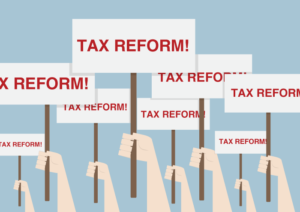How to be a “Tax-Conscious” Investor

How to be a “Tax-Conscious” Investor
“Uncle Sam wants you!” goes the slogan on that old poster. He also wants you to pay taxes. On the income from your employment. On what you earn from many of your investments. On a portion of the gain from the sale of those investments.
But there is a difference between the need to pay tax and paying more than your fair share. By being “tax conscious” as you consider your investment choices, it is possible to lower the overall amount of tax that you will have to pay.
Tax-deferred retirement plan investments
As you know, if you are a participant in a 401(k) or similar retirement plan (or if you own an IRA), the income that you earn from these investments is tax deferred. The same is true for the income earned on the investments in an IRA. Tax deferral has the major advantage of allowing your investments to grow significantly over time. Therefore, when you are years away from retirement, you have the opportunity to accumulate a significant sum.
Thus, it make sense to take advantage of tax-deferred retirement plans. However, it is important to recognize that, at some point, tax deferral will end, and tax will have to be paid. Keep in mind, too, that, in most cases, the tax will be paid at ordinary income tax rates—instead of receiving preferential treatment as long-term capital gain.
Should you consider tax exempts?
The answer is different for different investors. Tax-exempt investments yield a lower annual return than taxable investments. The logic of investing in tax exempts, then, rises and falls on making certain that the income from the lower yield will provide you with more than the after-tax return that you would receive from a taxable investment.
Certainly, high-income taxpayers will find a place in their portfolios for tax exempts. However, in light of lower income tax rates, the answer may become less clear-cut. Thus, investors should seek professional guidance before deciding whether they should be considering tax-exempt investments.
Taxes and mutual fund investing
The tax rules for buying and selling mutual funds are the same as for your other investments, but there are some added complications.
Fund managers regularly trade stocks and bonds, realizing gains and losses along the way. A mutual fund must distribute all of its income and net realized capital gains. You may reinvest these distributions in additional shares rather than take them in hand. Nevertheless, you are responsible for the taxes on the distributions—the income earned as well as the short and long-term capital gain realized.
The complications may turn out to be even more frustrating. For instance, a distribution may be made in a year in which the overall fund price has declined. What’s more, distributions declared during the last three months of the year, but not paid the following January, are taxable in the year that they were declared.
Most mutual funds will report the projected timing and amount of an upcoming distribution. One way that you can protect yourself is to find out before you purchase a fund when it plans to make its next distribution.
Taxes and investment return: a new reporting rule
Recognizing that many investors lack a clear understanding of the impact of taxes on investment returns, the Securities and Exchange Commission (SEC) has issued new rules regarding the disclosure of mutual fund after-tax returns. The goal of the new rules is to give investors a better sense of the true “bottom line” of fund returns.
Under the new rules, since February 15 of 2002, all investment companies have been required to disclose after-tax returns for one-, five- and ten-year periods in fund prospectuses and certain advertising and sales literature. Opting for a “worse-case scenario,” the disclosures must assume that taxes are paid at the “highest applicable individual federal income tax rate” (for 2004 income, 35%).
“Disclosure of standardized mutual fund after-tax returns,” says the SEC, “will help investors to understand the magnitude of tax costs and compare the impact of taxes on the performance of different funds.” The end result, the SEC believes, will be investors who will make better-informed investment decisions.
A strategy for the “tax-conscious” investor
What can you do to adopt the role of tax-conscious investor? Consider the following steps:
1. Put taxes on the list of considerations in developing your investment strategy and making your investment choices.
2. Look carefully at your trading habits. For instance, limiting your transaction activity in taxable mutual fund investments helps limit the capital gains from the sale of your shares—reducing your tax exposure.
3. Keep track of your investment gains and losses during the year. If you are realizing gains during the year, for example, you’ll want to look for potential losers to sell before December 31. By balancing your gains against your losses, you may be able to wipe out some otherwise taxable gain.
4. You may want to look at tax-efficient or tax-managed mutual funds—those that are designed to use special strategies to limit capital gains distributions. Funds such as large-cap or broad-market index funds fall into this category.
—————————————————————————————————————————————————————————————————————
We hope you found this article about “How to be a “Tax-Conscious” Investor” helpful. If you have questions or need expert tax or family office advice that’s refreshingly objective (we never sell investments), please contact us or visit our Family office page or our website at www.GROCO.com. Unfortunately, we no longer give advice to other tax professionals gratis.
To receive our free newsletter, contact us here.
Subscribe our YouTube Channel for more updates.

Alan Olsen, is the Host of the American Dreams Show and the Managing Partner of GROCO.com. GROCO is a premier family office and tax advisory firm located in the San Francisco Bay area serving clients all over the world.
Alan L. Olsen, CPA, Wikipedia Bio

GROCO.com is a proud sponsor of The American Dreams Show.

The American Dreams show was the brainchild of Alan Olsen, CPA, MBA. It was originally created to fill a specific need; often inexperienced entrepreneurs lacked basic information about raising capital and how to successfully start a business.
Alan sincerely wanted to respond to the many requests from aspiring entrepreneurs asking for the information and introductions they needed. But he had to find a way to help in which his venture capital clients and friends would not mind.
The American Dreams show became the solution, first as a radio show and now with YouTube videos as well. Always respectful of interview guest’s time, he’s able to give access to individuals information and inspiration previously inaccessible to the first-time entrepreneurs who need it most.
They can listen to venture capitalists and successful business people explain first-hand, how they got to where they are, how to start a company, how to overcome challenges, how they see the future evolving, opportunities, work-life balance and so much more..
American Dreams discusses many topics from some of the world’s most successful individuals about their secrets to life’s success. Topics from guest have included:
Creating purpose in life / Building a foundation for their life / Solving problems / Finding fulfillment through philanthropy and service / Becoming self-reliant / Enhancing effective leadership / Balancing family and work…

MyPaths.com (Also sponsored by GROCO) provides free access to content and world-class entrepreneurs, influencers and thought leaders’ personal success stories. To help you find your path in life to true, sustainable success & happiness. It’s mission statement:
In an increasingly complex and difficult world, we hope to help you find your personal path in life and build a strong foundation by learning how others found success and happiness. True and sustainable success and happiness are different for each one of us but possible, often despite significant challenges.
Our mission at MyPaths.com is to provide resources and firsthand accounts of how others found their paths in life, so you can do the same.
Where Do Most Americans Fall With Proposed Tax Reform?
Where Do Most Americans Fall With Proposed Tax Reform? Tax reform is coming. At least that’s what we’ve been led to believe for the better part of a year now. Ever since Donald Trump won the election last November, most of the nation has been expecting tax reform. Here we are a year later and…
What’s the Biggest Mistake By People Who Work a Side Job?
What’s the Biggest Mistake By People Who Work a Side Job? Everyone wants to make more money. For many that mean picking up a side job to earn a little more cash. There are literally hundreds of side jobs out there but most are only good for a few extra dollars. However, there is a…
Senate’s Tax Bill Would Raise Taxes on Stock Sales
Senate’s Tax Bill Would Raise Taxes on Stock Sales Capital gains have long been a controversy when it comes to taxes. Many high net worth individuals use capital gains to make the majority of their money. Because the tax rate on gains from stock sales are much lower than taxes on personal income, this is…
Five Helpful Tips to Be More Productive and Organized
Five Helpful Tips to Be More Productive and Organized You want to be more organized, right? Most people do. However, there are certain things you need to do in order to get more organized and become more productive. The problem is, many people spend way too much time on tasks of little or no consequence.…




